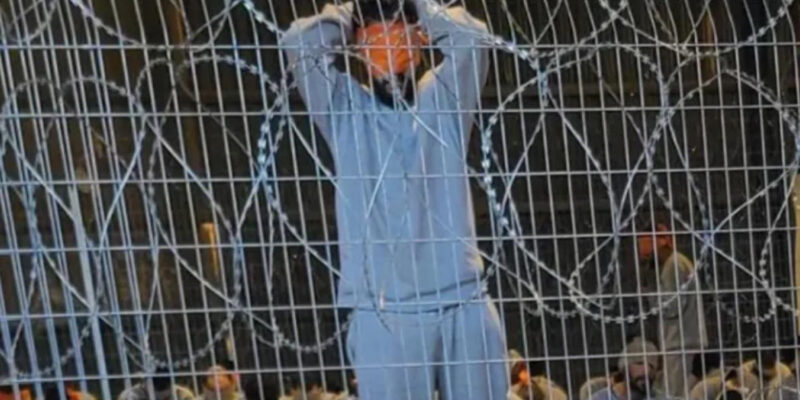Ibrahim Salem, a 34-year-old Palestinian, recently shared the harrowing experiences he endured during his eight-month detention in Israel’s Sde Teiman prison.
He was detained by Israeli forces under circumstances that remain unclear and faced brutal treatment that has left him deeply scarred.
Salem, who worked as a barber, was at Kamal Adwan Hospital in Gaza on December 12, 2023, when Israeli forces stormed the facility and arrested him. Just days earlier, his home in the Jabalya refugee camp had been targeted by an Israeli airstrike, killing eight of his family members and injuring his wife and two of their children. As he visited his children in the intensive care unit, he was suddenly detained, a situation he found baffling. “I was confused. Why was I arrested? I have nothing to do with resistance groups… There were no accusations against me,” Salem explained from a displacement camp in Al-Mawasi, southern Gaza.
Upon his arrest, Salem and other Palestinians at the hospital were handcuffed, blindfolded, and transported “like animals” on trucks. He then disappeared for eight months, his whereabouts unknown to his family and friends.
The Israeli Defense Forces (IDF) later claimed that the hospital was being used as a command center by Hamas, allegations that the group has consistently denied. These claims have not been independently verified.
In May 2024, CNN released an investigative report shedding light on the harsh conditions faced by detainees at Sde Teiman, a secretive military base located in the Negev desert near Gaza. The report featured a photograph of a blindfolded prisoner behind barbed wire, his hands raised in a gesture of submission. Salem’s twin brother, Waseem, recognized him in the image and contacted CNN.
Salem was eventually transferred to Ktzi’ot Prison, another detention facility in the Negev, where he remained until his release without charges on August 1, 2024. His lawyer, Saja Mishreqi, who works with the Public Committee Against Torture in Israel (PCATI), was informed by the Israeli Supreme Court about his whereabouts in late May.
During his time in Sde Teiman, Salem experienced a series of abuses, including physical beatings, verbal harassment, and being scalded with hot water. He recounted that prisoners were often held in their underwear, but before interrogations, he was forced to strip completely naked. Salem described this as the most humiliating part of his detention, saying it was a deliberate tactic to degrade him.
“They would bring the metal detector and run it all over our bodies, then they would hover it over private parts and hit me there,” he recalled. The abuse escalated further when a baton was forcibly inserted into his body. After each interrogation, he was given only seconds to put his underwear back on, with any delay resulting in additional beatings.
Salem also remembered the constant fear of hearing screams, followed by gunshots, and then an eerie silence. “It was a nightmare,” he said, reflecting on the torment he and others faced during their detention.
The IDF stated that Salem had been detained on suspicion of involvement in terrorist activities and was held at Sde Teiman for about a month and a half before being transferred to the prison service. The IDF added that misconduct during detention is strictly prohibited under Israeli law and military orders, but they did not provide details on the specific conditions of his detention.
When contacted by CNN, the Israel Prison Service referred all inquiries about legal processes, arrest policies, and interrogations involving national security prisoners to the IDF and the Israel Security Agency (Shin Bet), which has not responded to requests for comment.
Salem’s story highlights the severe and often opaque conditions faced by Palestinian detainees in Israeli custody, raising questions about the treatment of prisoners and the use of military facilities for detention purposes.










Join our Channel...